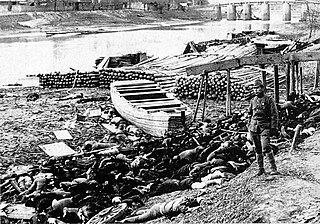
State terrorism refers to acts of terrorism which a state conducts against another state or against its own citizens.

A cluster munition is a form of air-dropped or ground-launched explosive weapon that releases or ejects smaller submunitions. Commonly, this is a cluster bomb that ejects explosive bomblets that are designed to kill personnel and destroy vehicles. Other cluster munitions are designed to destroy runways or electric power transmission lines.
Geopolitics is the study of the effects of Earth's geography on politics and international relations. While geopolitics usually refers to countries and relations between them, it may also focus on two other kinds of states: de facto independent states with limited international recognition and relations between sub-national geopolitical entities, such as the federated states that make up a federation, confederation, or a quasi-federal system.

Thomas Loren Friedman is an American political commentator and author. He is a three-time Pulitzer Prize winner who is a weekly columnist for The New York Times. He has written extensively on foreign affairs, global trade, the Middle East, globalization, and environmental issues.
Anti-French sentiment in the United States has consisted of unfavorable estimations of the French government, culture, language or people of France by people in the United States of America spurred on by media and government leaders.
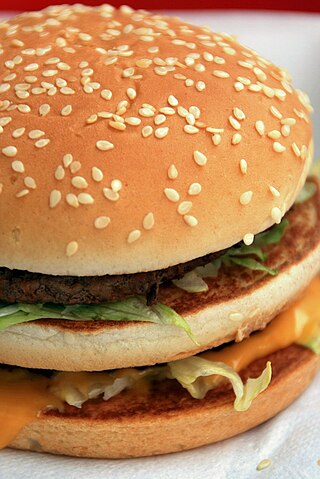
The Big Mac Index is a price index published since 1986 by The Economist as an informal way of measuring the purchasing power parity (PPP) between two currencies and providing a test of the extent to which market exchange rates result in goods costing the same in different countries. It "seeks to make exchange-rate theory a bit more digestible." The index compares the relative price worldwide to purchase the Big Mac, a hamburger sold at McDonald's restaurants.

Aleksandr Gelyevich Dugin is a Russian far-right political philosopher.

Strategic Forecasting Inc., commonly known as Stratfor, is an American strategic intelligence publishing company founded in 1996. Stratfor's business model is to provide individual and enterprise subscriptions to Stratfor Worldview, its online publication, and to perform intelligence gathering for corporate clients. The focus of Stratfor's content is security issues and analyzing geopolitical risk.
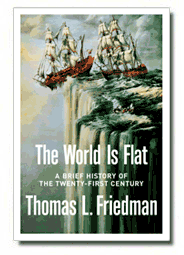
The World Is Flat: A Brief History of the Twenty-first Century is a book by Thomas L. Friedman that analyzes globalization, primarily in the early 21st century. The title suggests the world has a more level playing field for commerce in which most competitors, except for labor, have an equal opportunity. He suggests that countries, companies and individuals need to remain competitive in a global market. Historical and geographic divisions are, according to the author, less important.

McDonald's Corporation is an American multinational fast food chain, founded in 1940 as a restaurant operated by Richard and Maurice McDonald, in San Bernardino, California, United States. They rechristened their business as a hamburger stand, and later turned the company into a franchise, with the Golden Arches logo being introduced in 1953 at a location in Phoenix, Arizona. In 1955, Ray Kroc, a businessman, joined the company as a franchise agent and proceeded to purchase the chain from the McDonald brothers. McDonald's previous headquarters was based in Oak Brook, Illinois, but the company moved its global headquarters to Chicago in June 2018. McDonald's is also a real estate company through its ownership of around 70% of restaurant buildings and 45% of the underlying land.

The American fast-food restaurant chain McDonald's was founded in 1940 and has since grown to the world's largest restaurant chain by revenue.

The Tahara plant is an automobile plant in Tahara, Aichi, Japan owned by Toyota Motor Corporation. The address is 3-1 Midorigahama, Tahara City, Aichi Prefecture.
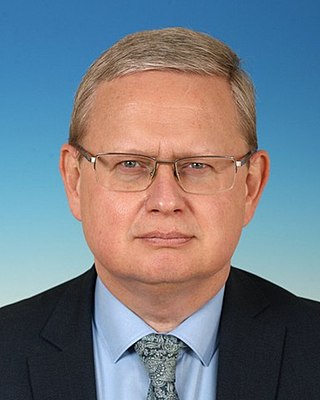
Mikhail Gennadyevich Delyagin is a modern Russian author, politician, and economist. A member of the Russian Academy of Natural Sciences, Delyagin took part in the experts team by the Supreme Soviet council from 1990 to 1991 and obtained an academic degree in economics in 1998. Director of the Problems issued by Globalization Institute (IPROG) and former chairman of the ideological council of the Rodina political party.
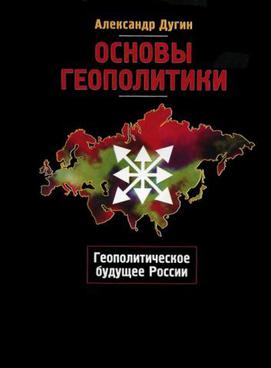
The Foundations of Geopolitics: The Geopolitical Future of Russia is a geopolitical book by Aleksandr Dugin. Its publication in 1997 was well received in Russia; it has had significant influence within the Russian military, police, and foreign policy elites, and has been used as a textbook in the Academy of the General Staff of the Russian military. Powerful Russian political figures subsequently took an interest in Dugin, a Russian political analyst who espouses an ultranationalist and neo-fascist ideology based on his idea of neo-Eurasianism, who has developed a close relationship with Russia's Academy of the General Staff.
The capitalist peace, or capitalist peace theory, or commercial peace, posits that market openness contributes to more peaceful behavior among states, and that developed market-oriented economies are less likely to engage in conflict with one another. Along with the democratic peace theory and institutionalist arguments for peace, the commercial peace forms part of the Kantian tripod for peace. Prominent mechanisms for the commercial peace revolve around how capitalism, trade interdependence, and capital interdependence raise the costs of warfare, incentivize groups to lobby against war, make it harder for leaders to go to war, and reduce the economic benefits of conquest.
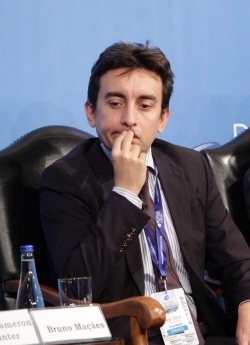
Bruno Maçães is a Portuguese politician, consultant and author. He is a senior advisor at Flint Global, former Secretary of State for European Affairs in Portugal, and a columnist for the New Statesman. He is a Member of the European Council on Foreign Relations and a Member of the Advisory Council for the Brussels Institute of Geopolitics.

From 1990 to 2022, the American fast food chain McDonald's operated and franchised McDonald's restaurants in Russia.

On 9 March 2022, the Russian Air Force bombed Maternity Hospital No 3, a hospital complex functioning both as a children's hospital and maternity ward in Mariupol, Ukraine, during the Russian invasion of Ukraine, killing at least four people and injuring at least sixteen, and leading to at least one stillbirth.
In March 2022, during the Russian invasion of Ukraine, Russian officials falsely claimed that public health facilities in Ukraine were "secret U.S.-funded biolabs" purportedly developing biological weapons, which was debunked as disinformation by multiple media outlets, scientific groups, and international bodies. The claim was amplified by China's Ministry of Foreign Affairs and Chinese state media, and was also promoted by followers of the QAnon conspiracy theory and subsequently supported by other far-right groups in the United States.














